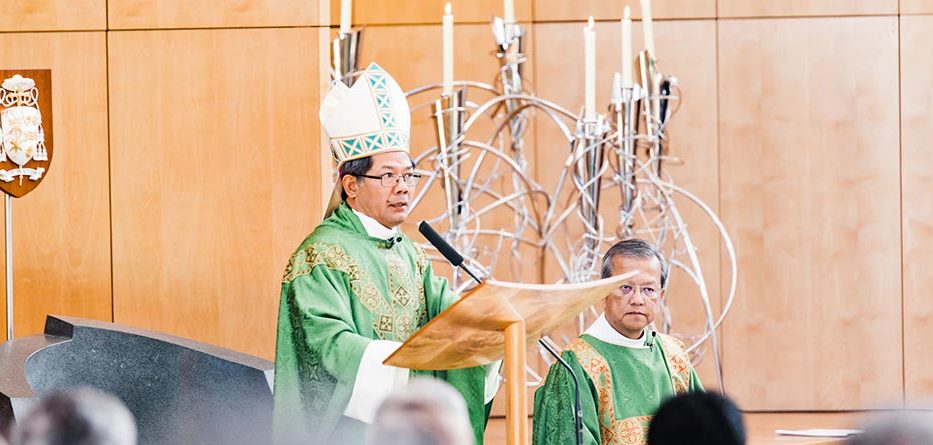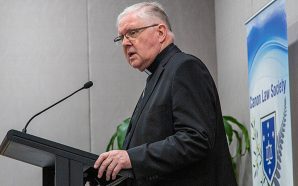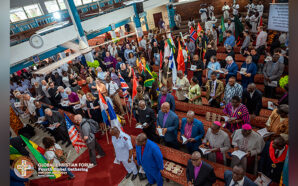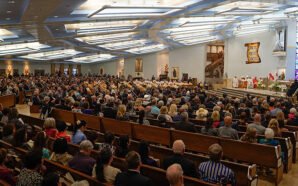Most Reverend Vincent Long Van Nguyen OFM Conv DD STL, Bishop of Parramatta
Homily for the Feast of St Bartholomew with the Executive Education Teams of Mt Druitt cluster at Loyola Catholic College, Mt Druitt
24 August 2017
Dear friends,
One of the characteristics of Jesus I find fascinating and confronting too is that he often challenges established thinking patterns. He subverts conventional wisdom and even turns prevalent cultural norms on their heads. The Gospel today is a case in point.
It tells us of a person called Nathanael who is never mentioned in any of the Synoptic Gospels. But again, that is not the only unique feature of John’s Gospel. There are so many stories, discourses and characters that appear in the Johannine account alone. What is even more interesting is the hidden meaning contained in each of them, which we need to dig deep into in order to discover.
Nathanael is a seeker – perhaps like the mysterious Nicodemus whose nocturnal conversation with Jesus is no less fascinating. Both are educated and devout Jews. Both struggle to understand the figure of the Messiah in the law and the prophets. We know how Nathanael struggles because when Philip says “We have found the Messiah and he is Jesus from Nazareth”, Nathanael responds with cynicism “From Nazareth? Can anything good come from that place”. I am sure the residents of this suburb – Mt Druitt – sometimes have to deal with the stereotyping and put-down that others throw at them. But Nathanael has a point. Nazareth is a Roman garrison and as such it is treated with disdain among Jews. The association of the Messiah with contempt would be the beginning of Nathanael’s conversion journey.
What follows next is a deeply engaging dialogue between him and Jesus. Upon seeing him, Jesus makes a complementary remark “There is an Israelite in whom there is no deception”. Israelite here refers to Nathanael’s ancestry. He is a descendant of Jacob who is known also as Israel. Jacob, of course, won his birthright over Esau by deception. This is something Nathanael has struggled with: “How can God’s salvation history be accomplished through acts of deception?” If the truth be known, the line of Jesus’ genealogy runs through some morally dubious circumstances such as the incest of Tamar, the prostitution of Rahab and, of course, the tryst between David and Bathsheba.
Nathanael could not accept that God could act through such deceptive ways of human behaviour. This can be inferred from Jesus’ remark about him. Furthermore, Nathanael’s response seems to confirm this internal struggle: “How do you know so much about me already? How do you know I am struggling with this?” To which Jesus replies “I saw you under the fig tree”.
The fig tree is often a place for devout Jews to study the Scriptures and to pray. It is then a metaphor for man’s quest for God. By saying that he saw Nathanael praying under the fig tree, Jesus in effect announces that he understands Nathanael’s deepest thoughts and struggles. It is this messianic insight that convinces Nathanael that Jesus is indeed “the Son of God and the King of Israel”. In conclusion, Jesus takes Nathanael to another level of understanding about the Messiah. He refers to his death on the cross which will be a kind of a new Jacob’s ladder. “You will see heaven laid open and above the Son of Man, the angels of God ascending and descending”. In other words, Jesus by his death will fulfill Jacob’s dream of heaven and earth united and reconciled.
I think we can all learn from Nathanael in our struggle for truth, wholeness and integrity. Nathanael was deeply steeped in his tradition and culture. But when he met Jesus, he was challenged to grow beyond what he had been brought up. He went a step further; he was led into greater and deeper faith. The limits of his understanding were further expanded; the old convictions were replaced with fresh insights into the nature of the Messiah. Perhaps, the hardest lesson he learned was the way of powerlessness and vulnerability which should underline the Messiah’s mode of operation. This would ultimately be the way of Christian discipleship into which Nathanael was “introduced” by Philip.
We need to be alert and open to God’s saving grace at all times, in all places and people. Pope Francis says that the Church needs to know how to recognise the Lord’s action in the world, in culture and in people’s daily lives and experiences. It calls us to broaden our perspective, ever mindful that truth, wholeness and integrity can be found beyond the limits of our tradition, culture, upbringing and even in places we least expect.
As we pray for the guidance of the Holy Spirit on our work, we recommit ourselves to following the way of the Messiah as revealed to Nathanael, the way of powerlessness, vulnerability. If God could use unworthy instruments like Tamar, Rahab and Bathsheba, then we must let go of our prejudice and welcome the agency of God’s unlikely. May we who are the leaders in the style of the humble servant-leader by such a discipleship model bring others to Christ and become the conduit for God’s love and compassion to flow to others.








